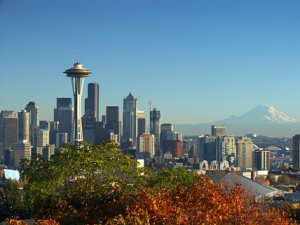With a booming economy, an influx of new residents and legal recreational pot, Seattle fancies itself a happenin’ place as it dances through the end-of-the-year holiday period. The problem, unfortunately, is that not all of the happenings are uplifting.
The world’s largest tunnel boring machine–stuck under the Seattle waterfront, where it has barely budged since stalling two Pearl Harbor Days ago–is so heavy (6,700 tons) that it has begun to cause cracks in nearby office buildings, some of the oldest in earthquake-prone Seattle and therefore probably the most rickety. The Japanese-made machine is supposed to be boring a one-lane-in-each-direction underground toll road for nearly two miles so that the two-lanes-in-each-direction above-ground free Alaskan Way Viaduct can be removed.
The machine is called Bertha–not alliteratively because it is big, although, with a diameter of 57 feet, it is, but in honor of Seattle’s first and only woman mayor, Bertha Landes, elected in 1926. The project is proving to be a libel on her good name. The project was abruptly halted on December 7, 2013, after Bertha hit a metal pipe that the parties–the Washington State Department of Transportation and private contractor Seattle Tunnel Partners–both knew about but didn’t bother to remove. The mess has become a tourist attraction.
The current completion date has been pushed back nearly two years, to late 2017. Bets, anyone? As for the cost, well, officially it has stayed at $4 billion, including $1.4 billion just for the boring, although it’s hard to see how this won’t be busted big time. Who might pick up any extra tab? The tolls can’t possibly be put high enough (especially since there would be any number of free city street alternatives for motorists). One way or the other, it likely would be taxpayers, although it remains to be seen whether it would be those of just Seattle or the state as a whole.
City taxpayers would have scant grounds to complain about being forced to shoulder the tab for the tunnel sinking Seattle. Shortly after I became New To Seattle in 2011, Seattle voters overwhelmingly approved what amounted to a referendum on the project. It was beyond me then why, in traffic-clogged Seattle, removing half the vehicular capacity on one of the city’s only two north-south limited-access highways looked like a good idea. It’s still beyond me.
But speaking of taxes, Washington State Governor Jay Inslee is poised to become the latest politician to to break a no-new-taxes-on-my-watch pledge, in his case one that he made repeatedly when successfully running for office in 2012. Last week, the former Democratic Congressman announced support for new taxes, including the state’s first capital gains levy, a tax on carbon emissions and increased taxes on bottled water, cigarettes and oil refineries.
The Washington State constitution prohibits an income tax. So Washington politicians nickel and dime it with so many other taxes that the state ranks only in the middle of the 50 states for per capita tax burden. One manifestation of this is the sales tax, which in Seattle, about to rise 0.1% to 9.6%, is already the highest among the nation’s big cities. Washington State also relies to an unusual degree–nearly 20% of the state budget–on hidden business and occupation taxes, which many companies and professionals pay and pass along to customers but aren’t broken out on receipts like the sales tax. It’s a major reason why Seattle and other Washington State cities have relatively high costs of living.
Long before the Bertha debacle, the state’s need for additional revenue, especially for education, was well known, including, presumably, by Inslee. Nevertheless, he is trying to blame the Republicans and conservative Democrats who control the state Legislature. This is a stretch, since, on paper, he and his opponents all have been against tax increases.
But forget Bertha and taxes. The really big grumbling in Seattle is over new rules and penalties on trash recycling that kick in on January 1. This may be the most stress-inducing development of all, given that there already are published specifications on hundreds and hundreds of trash categories.
Seattle, which fancies itself an environmentally conscious city (despite the presence of large numbers of SUVs and other gas-guzzling vehicles), has elaborate and rather confusing home trash pickup rules. Disposed material has to be sorted and put into three bins, one for recyclables (mainly paper, cans and bottles), one for yard waste and food scraps that the city can compost, and the last one for garbage, which is everything else and which goes into expensive landfills. Some plastics go in one bin, other kinds of plastics in another. The rules sometimes flummox the collectors themselves.
In an effort to cut down on the garbage, the city is directing that paper towels, pizza boxes, napkins and other items with traces of food go into the food and yard waste bin rather than the recycle or garbage bin. Violators will get written warnings, and then, starting July 1, small fines.
The Seattle Times story about this online has drawn nearly 300 trash talk comments, most of them against the rules and not a few of them quite funny. That’s more comments than were posted on the paper’s last Bertha story, but less than half the number appended to the account of Inslee’s big tax proposal.
As I see it, only one thing can restore domestic tranquility to Seattleites. Go Seahawks!


Pingback: Suspense in Seattle grows as tunneling moves under Viaduct | New To Seattle
Pingback: Seattle's home state still has country's most regressive tax system - New To Seattle
Pingback: In blasting Pete Carroll, Seattle forgets it grew through similar risk-taking - New To Seattle
Pingback: Seahawks make locals forget about Seattle Freeze-for now - New To Seattle